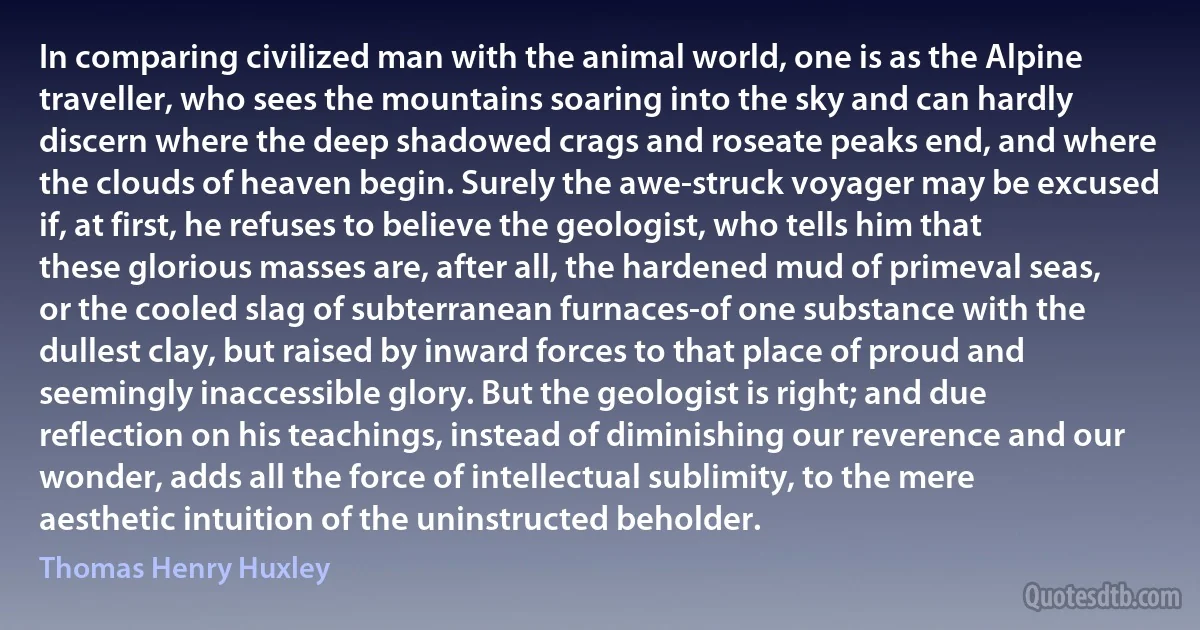
In comparing civilized man with the animal world, one is as the Alpine traveller, who sees the mountains soaring into the sky and can hardly discern where the deep shadowed crags and roseate peaks end, and where the clouds of heaven begin. Surely the awe-struck voyager may be excused if, at first, he refuses to believe the geologist, who tells him that these glorious masses are, after all, the hardened mud of primeval seas, or the cooled slag of subterranean furnaces-of one substance with the dullest clay, but raised by inward forces to that place of proud and seemingly inaccessible glory. But the geologist is right; and due reflection on his teachings, instead of diminishing our reverence and our wonder, adds all the force of intellectual sublimity, to the mere aesthetic intuition of the uninstructed beholder.
Thomas Henry HuxleyRelated topics
aesthetic alpine animal begin believe clay deep due end force geologist glory heaven inaccessible intellectual intuition man mass mere mud place reflection right sky slag soaring sublimity wonder world travellerRelated quotes
Behold therefore, this England of the Year 1200 was no chimerical vacuity or dreamland, peopled with mere vaporous Fantasms, Rymer's Foedera, and Doctrines of the Constitution, but a green solid place, that grew corn and several other things. The Sun shone on it; the vicissitude of seasons and human fortunes. Cloth was woven and worn; ditches were dug, furrowfields ploughed, and houses built. Day by day all men and cattle rose to labour, and night by night returned home weary to their several lairs. In wondrous Dualism, then as now, lived nations of breathing men; alternating, in all ways, between Light and Dark; between joy and sorrow, between rest and toil, between hope, hope reaching high as Heaven, and fear deep as very Hell. Not vapour Fantasms, Rymer's Foedera at all!

Thomas Carlyle
We ought to be able to see more clearly just for what reason the mass-man is so easily turned into a fanatic. What I seem to myself to have grasped is this, that such permeability is due to the fact that man, that the individual, in order to belong to the mass, to be a mass-man, has had, as a preliminary, though without having had the least awareness of it, to divest himself of that substantial reality which was linked to his initial individuality or rather to the fact of his belonging to a small actual group. The incredibly sinister role of the press, the cinema, the radio, has consisted in passing that original reality through a pair of flattening rollers to substitute for it a superimposed pattern of ideas and images with no real roots in the deep being of the subject of this experiment.

Gabriel Marcel
Japan had come to terms with Russia because of her difficulties, but this did not mean approval of communism. Communism meant the end of emperor-worship, and feudalism and the exploitation of the masses by the ruling class, and indeed almost everything that the existing order stood for... But communism is the outcome of widespread misery due to social conditions, and unless these conditions are improved, mere repression can be no remedy. There is a terrible misery in Japan at present. The peasantry, as in China and India, are crushed under a tremendous burden of debt. Taxation, especially because of heavy military expenditure and war needs, is very heavy. Reports come of starving peasants trying to live on grass and roots, and of selling even their children. The middle classes are also in a bad way owing to unemployment and suicides have increased.

Jawaharlal Nehru
In her book, Philosophy in a New Key, Susanne Langer remarks that certain ideas burst upon the intellectual landscape with a tremendous force. They resolve so many fundamental problems at once that they seem also to promise that they will resolve all fundamental problems, clarify all obscure issues. Everyone snaps them up as the open sesame of some new positive science, the conceptual center-point around which a comprehensive system of analysis can be built. The sudden vogue of such a grande ideé, crowding out almost everything else for a while, is due, she says, "to the fact that all sensitive and active minds turn at once to exploiting it. We try it in every connection, for every purpose, experiment with possible stretches of its strict meaning, with generalizations and derivatives.”.

Clifford Geertz
It is little wonder that people at home and abroad consider Independence Hall as hallowed ground and revere the Liberty Bell as a sacred relic. That pile of bricks and mortar, that mass of metal, might appear to the uninstructed as only the outgrown meeting place and the shattered bell of a former time, useless now because of more modern conveniences, but to those who know they have become consecrated by the use which men have made of them. They have long been identified with a great cause. They are the framework of a spiritual event. The world looks upon them, because of their associations of one hundred and fifty years ago, as it looks upon the Holy Land because of what took place there nineteen hundred years ago. Through use for a righteous purpose they have become sanctified.

Calvin Coolidge
